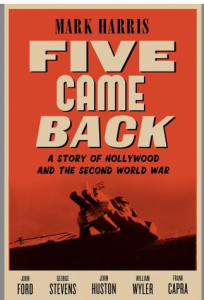I just finished a book by Mark Harris called “Five Came Back” about five famous Hollywood movie directors from the 40’s who left their lucrative private sector careers to enlist in the Army and Navy during World War !!. The five, John Huston, John Ford, WIlliam Wyler, George Stevens, and Frank Capra were assigned to special units that were supposed to photograph the war for propaganda purposes, and to produce wartime documentaries that encouraged US citizens to support the war.
Coming from the rather rarified atmosphere of Hollywood, all of these men were stunned at the scope of military bureaucracy, and at the difficulty they found in getting things approved and done. But they were all solidly behind the war, and even though some of them saw atrocities, they were largely uncritical of the American war effort.
The war, however, cost them more than just the lost income when they enlisted. William Wyler lost most of his hearing when he got down on his belly in a P-47 fighter bomber to photograph a bombing raid. When he returned to Hollywood, it was to make “The Best Years of Our Lives,” a movie about three veterans and their difficulties going back to civilian life.
Frank Capra lost his momentum as a director after spending more than four years in a military bureaucracy. When he returned, he tried to make the same screwball comedies that made him famous, but Americans weren’t in the mood, and rejected his 1947 “It’s a Wonderful Life” in favor of Wyler’s darker movie.
Both John Ford and John Huston came back from the war as serious alcoholics, and found their readjustment difficult and their marriages in jeopardy. Ford won two Academy Awards for documentaries he produced while in the Navy, but after the war he retreated to mainly Westerns, avoiding war films. He filmed the German concentration camps and his footage was used as evidence in the Nuremberg trials.
And George Stevens, who accompanied the American forces into Germany at the end of the war and photographed the concentration camps at Auschwitz, Bergen-Belsen and Dachau, could never make another comedy movie again. Of all the five, he saw the worst of the atrocities and came the closest to losing his enthusiasm for war. In the camps, he saw rotting piles of corpses, crematoriums with their gas flames still lit, and starving people who didn’t even know how to react to their liberation.
Something that became apparent to all of them during the war was that the veterans coming home were not coming home to the same America they left, nor were they the same people. John Huston even made a documentary, “Let There Be Light,” about the veterans’ hospital where veterans with debilitating emotional trauma were treated with shock therapy and talk therapy for “battle neurosis,” as it was then called. This was probably the first film about what we now know as PTSD.
I was really moved by this book, because I’d grown up with Tom Browkaw’s treatment of the World War II generation as “The Greatest Generation.” But now I know their trauma after their war was as great as that of the Vietnamese war vets who are still homeless as old men in the streets of America, and the crippled and emotionally disturbed young men who are unemployed and suffering after the wars in Iraq and Afghanistan.
You’d think we would know better, after all these years, than to send off all our young men — and now women as well — to be slaughtered physically and mentally by war after war, to return under the same circumstances, if they return at all, as so many did in 1945.





{ 3 comments… read them below or add one }
Thanks for this review. I found it interesting.
I grew up in the sixties, and my dad never spoke of his wartime experience. Somewhere I learned that after a mission he would get so drunk he had to be rolled into bed. We were lucky though. Apart from being very closed about experiences that kept him out of airplanes for decades, he would only drink a glass of beer on very rare occasions, and a glass of wine on Shabbat.
I sometimes struggle with depression and have spent a few nights self-medicating with alcohol to get to sleep.
None of the Viet Nam vets talked about the war afterward except the ones who made movies about it, just like after World War II. And I went to Ho Chi Minh city last summer and was horrified by their War Remnants Museum and what was done to them in that war.
Oh, sorry about that, I was referring to my dad’s WWII experience in the 8th Air Force.
Two really interesting books I’ve read in the past five years, and I am (mostly) certain you’ve read one: Ordinary Heroes by Scott Turow, and then Up Country by Nelson DeMille which I found to be:
+ really interesting mystery story / spy story about a murder that occurs during the Vietnam War and is investigated in 1997
+ a soldier’s thoughts about reconciliation with the Vietnamese
+ an educational travelogue along Highway 1 in Vietnam in the context of the history of the Vietnam War.
I was a little young for the Vietnam War, watched the PBS special by Stanley Karnow and read his book, but Up Country in many ways brought it home for me, and helped me make sense of the various Vietnam war movies produced since then. Well, Up Country and Google Maps.